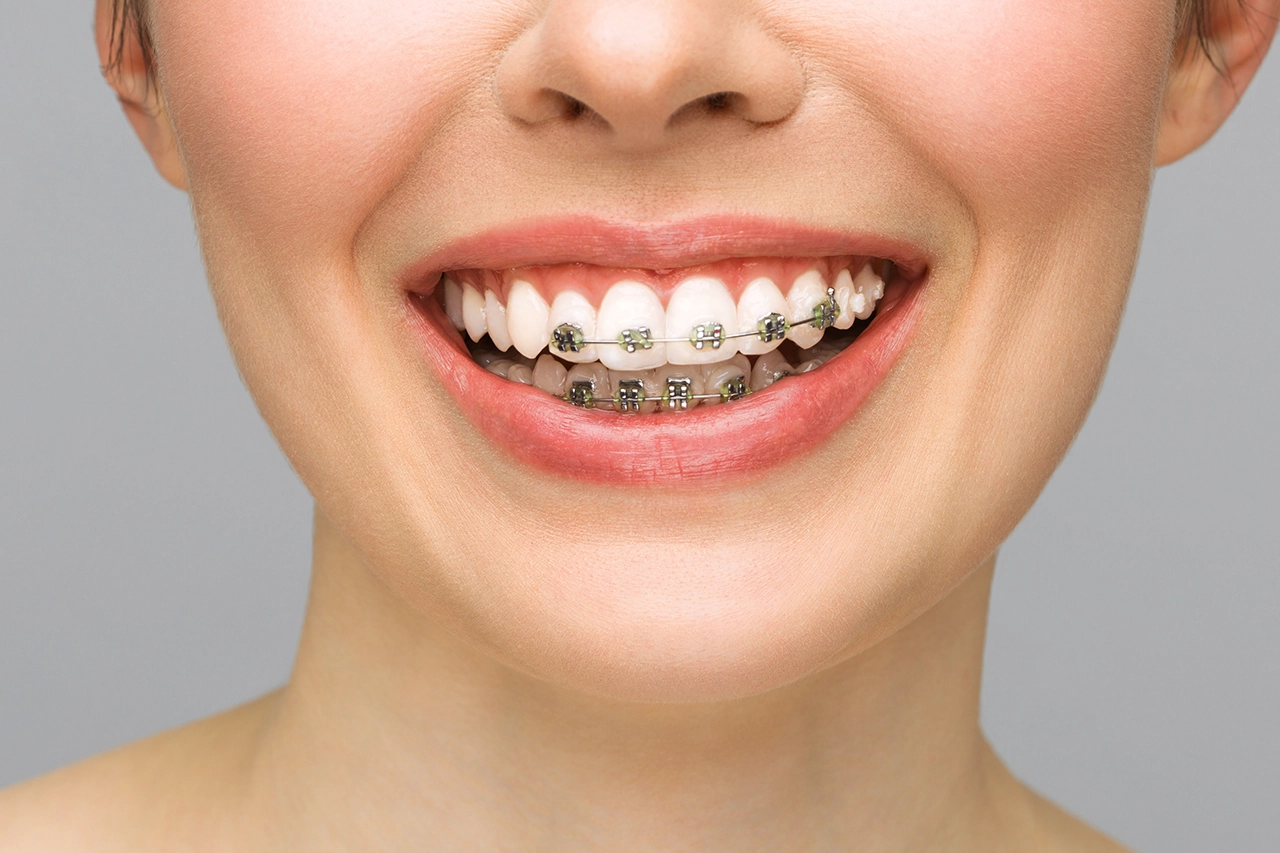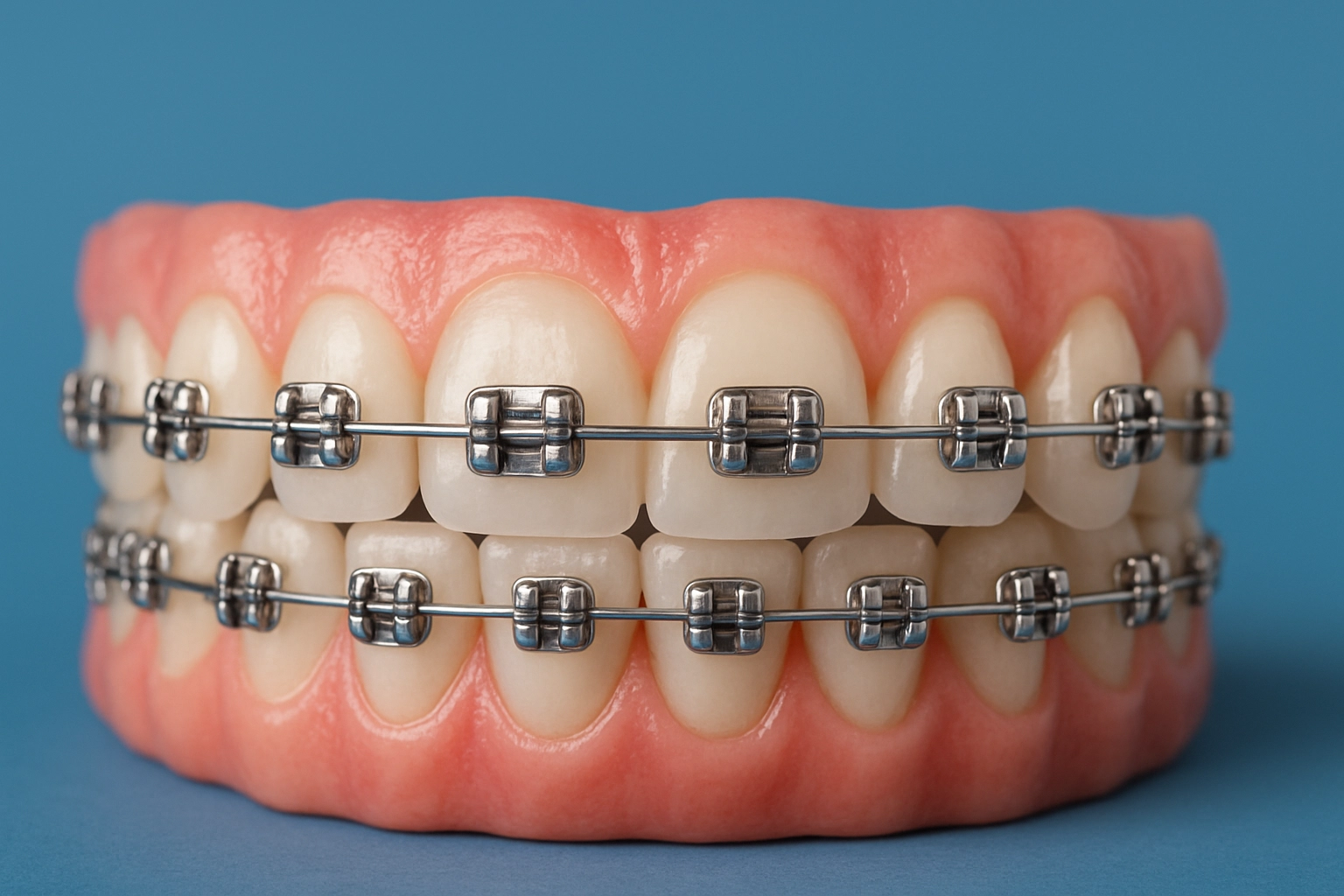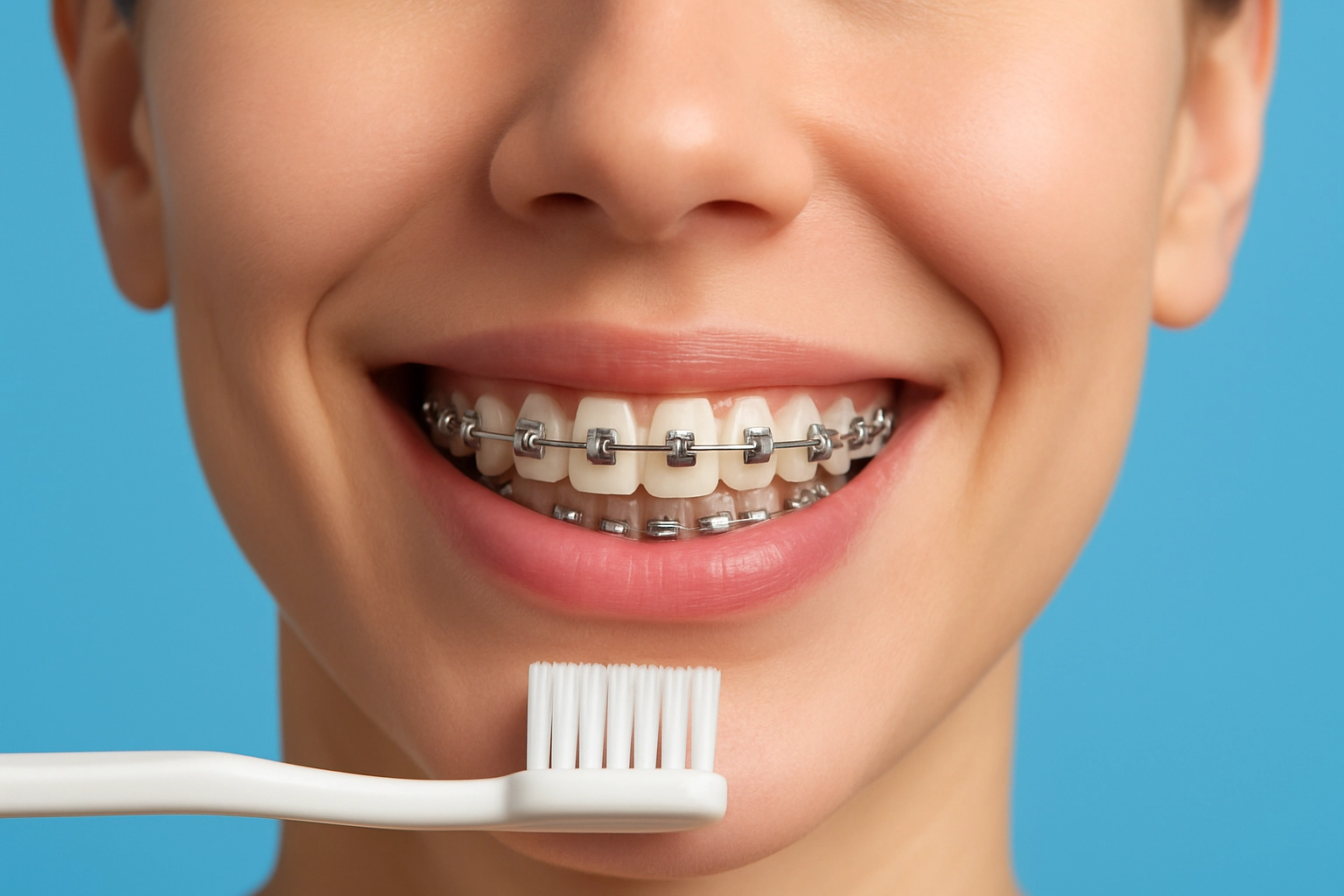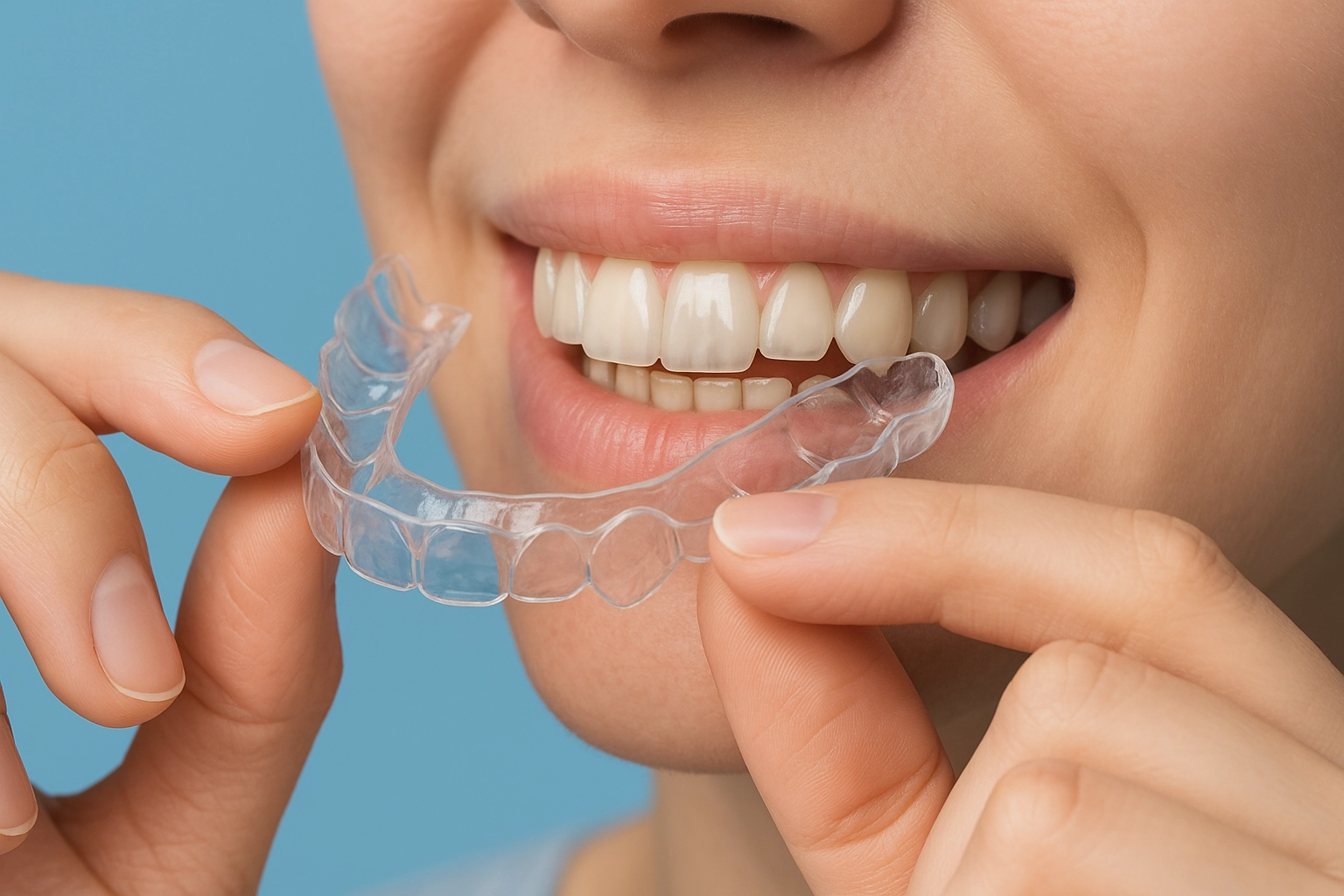
Adult Braces in Sussex UK - What to Expect & How to Manage Them
In recent years, there's been a notable increase in adults seeking orthodontic treatment. Whether driven by aesthetic desires or functional needs, adult braces have become a viable solution for many. At Brighton Implant Clinic, we've witnessed firsthand the transformative power of braces, not just in smiles but in self-confidence.
Historically, braces were predominantly associated with adolescence. However, advancements in orthodontic technology and a broader understanding of oral health have made it clear that it's never too late to achieve a straighter smile. Adults are now embracing braces to correct long-standing dental issues, improve oral hygiene, and enhance their overall appearance.
One of our patients, Natalie, shared her journey:
"At 24, I decided to get braces again. My teeth had shifted over the years, and I wanted a smile that felt like me. It wasn't about anyone else's opinion; it was about feeling confident in my own skin."
Her story underscores a common sentiment among adults: the desire for a smile that reflects their inner confidence and vitality.
Assessing the Need: Are Braces Right for You?
Determining whether braces are suitable involves a comprehensive evaluation of your dental health. Common orthodontic issues in adults include:
- Crowded or overlapping teeth
- Gaps between teeth
- Overbites, underbites, or crossbites
- Jaw misalignment
These conditions can lead to challenges in maintaining oral hygiene, increased risk of gum disease, and even jaw discomfort.
During your initial consultation at Brighton Implant Clinic, our orthodontic specialists will conduct a thorough examination, including digital imaging and bite analysis. This assessment helps in crafting a personalized treatment plan tailored to your specific needs.
It's essential to set realistic expectations. While braces can significantly improve dental alignment, the extent of correction varies based on individual cases. Open communication with your orthodontist ensures that you're informed and prepared for the journey ahead.
Exploring Your Options: Types of Adult Braces

Modern orthodontics offers a variety of braces tailored to adult lifestyles and preferences:
Traditional Metal Braces
These are the most common type, consisting of metal brackets and wires. They're highly effective for correcting complex dental issues. While visible, advancements have made them more comfortable and less bulky than in the past.
Ceramic Braces
Similar in function to metal braces, ceramic braces use tooth-colored or clear brackets, making them less noticeable. They're a popular choice for adults seeking a more discreet option.
Lingual Braces
Placed on the backside of the teeth, lingual braces are virtually invisible from the front. They offer the benefits of traditional braces without the visible hardware, though they may take longer to adjust to.
Self-Ligating Braces
These braces use a specialized clip instead of elastics to hold the wire in place, resulting in fewer adjustments and potentially shorter treatment times. Damon braces are a well-known example of this type.
Clear Aligners
Brands like Invisalign offer removable, clear trays that gradually shift teeth into place. They're suitable for mild to moderate corrections and are favored for their minimal visibility and convenience.
Choosing the right type depends on various factors, including the complexity of your dental issues, lifestyle, and budget. Our team at Brighton Implant Clinic will guide you through these options to find the best fit for you.
Financial Considerations: Understanding the Costs
The cost of braces in the UK varies based on the type and complexity of treatment:
While the NHS offers orthodontic treatment, it's typically reserved for patients under 18 with significant dental issues. Adults often opt for private treatment, which provides a broader range of options and shorter waiting times.
At Brighton Implant Clinic, we understand that cost can be a concern. We offer flexible payment plans and will work with you to find a solution that fits your budget.
The Treatment Timeline: What to Expect
The duration of orthodontic treatment varies based on individual needs:
- Mild Corrections: 6 to 12 months
- Moderate Corrections: 12 to 18 months
- Complex Corrections: 18 to 36 months
Regular adjustment appointments are typically scheduled every 4 to 6 weeks. These visits allow your orthodontist to monitor progress and make necessary modifications.
It's important to note that treatment timelines are estimates. Factors such as patient compliance, oral hygiene, and biological response can influence the duration. Open communication with your orthodontist ensures that any concerns are addressed promptly.
Daily Life with Braces: Adjusting to the New Normal

Embarking on the journey of orthodontic treatment as an adult brings about several lifestyle adjustments. Understanding these changes can help ease the transition and ensure a smoother experience.
Initial Discomfort
It's common to experience some discomfort when braces are first applied or adjusted. This may manifest as soreness in the teeth and gums, or irritation on the inner cheeks and lips due to the brackets and wires. Over-the-counter pain relievers, such as ibuprofen or paracetamol, can alleviate this discomfort.
Additionally, orthodontic wax can be applied to brackets to reduce irritation. Warm saltwater rinses may also provide relief by soothing inflamed tissues.
Speech and Eating
Braces can temporarily affect speech, leading to slight lisping or difficulty pronouncing certain words. This usually subsides as you become accustomed to the appliances. Eating habits will also need modification. It's advisable to avoid hard, sticky, or chewy foods that can damage braces. Instead, opt for softer foods and cut items into smaller pieces to minimize strain on the brackets and wires.
Social Considerations
Adjusting to the appearance of braces can be challenging for some adults. However, many find that friends and colleagues are supportive and understanding. Embracing your treatment with confidence can positively influence how others perceive it. Remember, the end goal is a healthier, more aligned smile, which often outweighs temporary aesthetic concerns.
Oral Hygiene: Maintaining a Healthy Smile
Proper oral hygiene is paramount during orthodontic treatment to prevent complications such as tooth decay and gum disease.
Brushing Techniques
Brushing should be performed after every meal to remove food particles and plaque. Use a soft-bristled toothbrush or an electric toothbrush with a small head to navigate around brackets and wires.
Hold the brush at a 45-degree angle to clean above and below the brackets, ensuring all surfaces are reached. Replace your toothbrush or brush head every three months, or sooner if bristles become frayed.
Flossing and Interdental Cleaning
Flossing can be more challenging with braces, but it's essential for removing plaque between teeth. Utilize floss threaders or orthodontic floss to navigate under wires. Interdental brushes and water flossers are also effective tools for cleaning between teeth and around brackets. These devices can help prevent the buildup of plaque and reduce the risk of gum inflammation.
Mouthwash and Rinsing
Incorporate a fluoride mouthwash into your daily routine to strengthen enamel and protect against cavities. Rinsing with water after meals can also help dislodge food particles and reduce acidity in the mouth. Be cautious with whitening products, as they can cause uneven coloration if used during orthodontic treatment.
The Importance of Retention: Keeping Your Smile in Place

After the active phase of orthodontic treatment, retention is crucial to maintain the new position of your teeth.
Types of Retainers
Retainers can be removable or fixed. Removable retainers, such as Hawley or clear plastic types, are worn as directed by your orthodontist. Fixed retainers involve a thin wire bonded to the back of the teeth, providing continuous support. The choice depends on individual needs and the orthodontist's recommendation.
Wearing Your Retainer
Adherence to retainer wear is essential. Initially, you may need to wear it full-time, transitioning to nighttime wear as advised. Neglecting to wear your retainer can lead to relapse, where teeth gradually shift back to their original positions.
Long-Term Care
Regular check-ups with your orthodontist will monitor the stability of your results. Proper care of your retainer, including cleaning and safe storage, ensures its effectiveness and longevity.
Choosing the Right Provider: Partnering with Brighton Implant Clinic
Selecting an experienced and compassionate orthodontic provider is vital for a successful treatment journey.
At Brighton Implant Clinic, we specialize in adult orthodontics, offering personalized treatment plans tailored to your unique needs. Our state-of-the-art facilities and dedicated team ensure you receive the highest standard of care.
We invite you to schedule a consultation to explore your orthodontic options and take the first step toward achieving the smile you've always desired.
Frequently Asked Questions (FAQs)
Am I too old for braces?
No, age is not a barrier to orthodontic treatment. Many adults successfully undergo braces to correct dental issues and improve their smiles.
Will braces be painful?
Some discomfort is normal, especially after adjustments, but it typically subsides within a few days. Over-the-counter pain relievers can help manage any soreness.
Can I still eat my favorite foods?
While some foods should be avoided, many can still be enjoyed with minor modifications. Cutting food into smaller pieces and choosing softer options can help protect your braces.
How do I keep my braces clean?
Regular brushing, flossing, and using tools like interdental brushes or water flossers are essential. Maintaining good oral hygiene prevents complications and ensures effective treatment.
Conclusion: It's Never Too Late for a Confident Smile
Getting braces as an adult is a smart investment in both your appearance and oral health. Whether you're correcting long-standing issues or addressing relapse from previous treatment, modern orthodontic options make the process more comfortable and discreet than ever.
At Brighton Implant Clinic, we’re here to guide you through every step—offering expert care, tailored treatment plans, and support you can trust. Your age doesn’t limit your potential for a great smile.
Book your consultation today and take the first step toward the confident, healthy smile you deserve.










